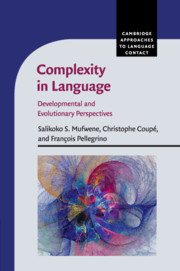
-
Select format
-
- Publisher:
- Cambridge University Press
- Publication date:
- 04 July 2017
- 30 March 2017
- ISBN:
- 9781107294264
- 9781107054370
- 9781107686625
- Dimensions:
- (228 x 152 mm)
- Weight & Pages:
- 0.52kg, 264 Pages
- Dimensions:
- (229 x 152 mm)
- Weight & Pages:
- 0.45kg, 264 Pages
- Subjects:
- Evolution of Language, Sociolinguistics, English Language and Linguistics: General Interest, Language and Linguistics
You may already have access via personal or institutional login- Subjects:
- Evolution of Language, Sociolinguistics, English Language and Linguistics: General Interest, Language and Linguistics
Book description
The question of complexity, as in what makes one language more 'complex' than another, is a long-established topic of debate amongst linguists. Recently, this issue has been complemented with the view that languages are complex adaptive systems, in which emergence and self-organization play major roles. However, few students of the phenomenon have gone beyond the basic assessment of the number of units and rules in a language (what has been characterized as 'bit complexity') or shown some familiarity with the science of complexity. This book reveals how much can be learned by overcoming these limitations, especially by adopting developmental and evolutionary perspectives. The contributors include specialists of language acquisition, evolution and ecology, grammaticization, phonology, and modeling, all of whom approach languages as dynamical, emergent, and adaptive complex systems.
Contents
Metrics
Altmetric attention score
Full text views
Full text views help Loading metrics...
Loading metrics...
* Views captured on Cambridge Core between #date#. This data will be updated every 24 hours.
Usage data cannot currently be displayed.
Accessibility standard: Unknown
Why this information is here
This section outlines the accessibility features of this content - including support for screen readers, full keyboard navigation and high-contrast display options. This may not be relevant for you.
Accessibility Information
Accessibility compliance for the PDF of this book is currently unknown and may be updated in the future.


